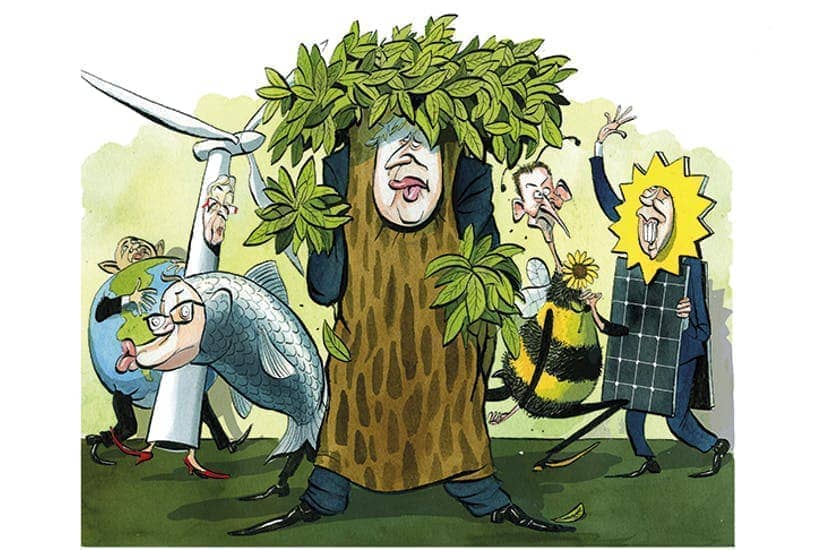It is 12 years now since a tranche of emails were scraped from the server of the University of East Anglia in what became know as Climategate. An East Anglia climate server was hacked, and the documents were pored over. The story won’t go away, not least because the BBC has just put out two programmes on the subject: a TV drama called the Trick, and a Radio 4 documentary called ‘The Hack That Changed the World’. Both try to establish the same narrative: that the scientists whose emails were leaked were victims of a crime — a massive data theft — and that these brilliant, honest people were then unfairly dragged through the mire as their integrity was questioned, when the world should really have been asking: who are the evil hackers and why are they trying to discredit climate science?
That the emails were ‘stolen’ is a fair enough description of what happened. Whether the BBC would use the same term had someone hacked into the computers of, say, an oil company and disclosed emails about what it knew about carbon emissions and climate change is quite another matter. I suspect that it might then prefer to view the story as one of legitimate public interest I certainly don’t recall the BBC covering the MPs’ expenses scandal – which happened in the same year as Climategate — as a mere data theft story.
Theft or no theft, Climategate revealed important matters of public interest
It matters because in treating Climategate as pure data theft story, you bury what it revealed about the practices of some climate scientists. It is true that some sceptics over-egged the scandal, wrongly claiming that the infamous words ‘hide the decline’ suggested that scientists knew global temperatures were falling, and were attempting to cover this up. It is also true that the scientists whose emails were leaked were cleared of scientific fraud in an investigation. Yet that doesn’t detract from serious questions over the science which was revealed by leak.
The ‘decline’ in ‘hide the decline’ in fact referred to an apparent fall in global temperatures from the 1960s onwards, as measured by the proxy of tree ring data. Tree rings, among other data, have been used to try to establish historic temperature record for the period prior to around 1900, for which we don’t have reliable, standardised temperature observations from thermometers. Trees grow faster when the weather is warmer, goes the theory, and therefore the thickness of tree rings can be used to tell us something about past global temperatures. Tree ring data, along with data from lake sediments, ice cores and so on was used to construct Michael Mann’s infamous ‘hockey stick’ graph which appeared to show fairly flat global temperatures throughout the past millennium until fossil fuel-burning led to a sharp jump.
But there is a problem. While temperature records and tree ring data seem to agree with the thermometer record for a period prior to 1960, they diverge after that date: tree ring data appear to show that global temperatures fell when the thermometer record shows the opposite. What do you do when faced with that realisation? The answer, in the case of the Climategate scientists, was to try to adjust the data so that the tree ring data agreed with the temperature data.
You don’t have to be a climate scientist to find your jaw dropping at this stage. In fact, it perhaps helps not to be a climate scientist, brought up on some of the methods which have become embedded in the science, to see the objections to doing this. Surely, if tree ring data diverges from thermometer data for several decades in which both are available, it should lead you to an inevitable conclusion: that tree ring data is not a good proxy for global temperatures. If it can’t tell you what temperatures have done in the past half century, it probably isn’t providing an accurate record about what was happening in the 1400s either.
That is why sceptics are right to be sceptical about the hockey stick graph and other graphs which purport to show trends in global temperatures spanning two eras: one in which we didn’t have accurate data from thermometers and one in which we did. To gather proxy data – some of which you know to be pretty useless – and to splice it in with real observational data doesn’t to me conform to high standards of objectivity which I expect from scientists.
That is not to question, of course, that global temperatures – as measured from thermometers – have risen over the past century. No, Climategate didn’t ‘disprove’ global warming or show that it was a scam. What is did confirm is that climate scientists are using highly questionable methods to construct a record of historic temperatures. Moreover, it showed the lengths to which some climate scientists would go to try to silence colleagues with whom they disagreed – in one case threatening to try to remove an editor from an academic journal. Theft or no theft, Climategate revealed important matters of public interest – especially given the extent to which we are now being asked to adjust our lifestyles to reduce carbon emissions – and the BBC is quite wrong to try to dismiss the public interest side and present it merely as some dark and dastardly crime.







Comments